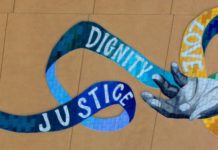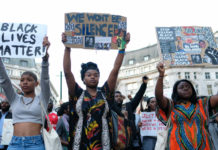Psychotropic Medications Serve as Powerful Tools for U.S. Military, Imperialism
Ethnographic research sheds light on extensive psychopharmaceutical use by soldiers in post 9/11 U.S. wars.
The FDA Is Hiding Reports Linking Psych Drugs to Homicides
In my wildest dreams, I could never have imagined being drawn into a story of intrigue involving my own government’s efforts to hide, from the public, reports of psychiatric drugs associated with cases of murder, including homicides committed by youth on the drugs. But that is precisely the intrigue I now find myself enmeshed in.
Invisible Trauma: The Children Left Behind When Parents Are Hospitalized
It would take decades before I recognized the trauma caused by repeatedly being separated from my mom when she was hospitalized. I grieved almost exactly the way children did who had lost a parent to death. Yet it was grief without closure because my mom was not dead, just... gone.
Psychology Must Become a Sanctuary Discipline to Heal Racial Trauma
Researchers explore pathways of healing racial trauma in Latinx immigrant communities.
Criticism of Coercion and Forced Treatment in Psychiatry
A recent editorial, published in BMJ, argues there is an increase in coercive measures in psychiatry that are damaging to individuals diagnosed with mental illness.
Study Finds Mistreatment and Psychological Distress Among LGBT Prisoners in the US
The rate of incarceration for lesbian, gay, and bisexual individuals is roughly three times that of the general population and they experience significantly higher rates of victimization and mistreatment in prison.
FDA Defends Decision to Approve Digital Aripiprazole
Members of the U.S. Food and Drug Administration’s Psychiatry Products division go on the defensive in a new article, responding to concerns about the agency’s approval of digital aripiprazole.
Michael Brown and the ‘Peer’ Movement
I’ve been arguing against calling this movement that I’m a part of a ‘peer’ movement for a long time. What has happened with Michael Brown in Ferguson, Missouri has helped me to crystallize that point. If we do not see what happens to some of us in the psychiatric system as connected to what happens to others because they are black or because they are transgender or because they love someone else of the same expressed gender (or because they live in poverty, etc. etc.), then I’m not sure any of us really, fully understands what it is we are trying to accomplish at all.
Bring Back the Asylum?
This week a commentary, written by members of the University of Pennsylvania Department of Medical Ethics and Health Policy and titled “Improving Long-term Psychiatric Care: Bring Back the Asylum” was published in JAMA Online. The authors recommend a return to asylum care, albeit not as a replacement for but as an addition to improved community services and only for those who have “severe and treatment-resistant psychotic disorders, who are too unstable or unsafe for community based treatment.” The authors seem to accept the notion of transinstitutionalization (TI) which suggests that people who in another generation would have lived in state hospitals are now incarcerated in jails and prisons. While I do not agree, I do find there is a need for a safe place for people to stay while they work through their crisis.
Regarding Representative Tim Murphy’s Helping Families In Mental Health Crisis Act
Representative Murphy has released the second version of the Helping Families in Mental Health Crisis Act (H.R. 2646). Few can argue that the mental health system and the current approach towards helping individuals and families in crisis are abysmal. H.R. 2646 is an effort to create increased service provisions and to enhance interventions that many professionals, family members and service users alike believe to be effective. When people are desperate and suffering they do not wish to be told "Sorry, there's nothing we can do." And so, it is understandable and even laudable that so many support the proposals laid out in H.R. 2646. But the bill is based on distorted and faulty logic that misrepresents the research and evidence base. This is highly disconcerting. And so a collective of mental health professionals, mental health advocates, and persons with lived experience came together to produce the following documents in response to H.R. 2646.
Danger Ahead if HR 2646 (the “Murphy Bill”) Passes!
Dear Reader, I am reaching out to you in the hope that you will get this message in time to act! Even if you only have time to read the first two sentences of this blog, please click here for instructions on how you can win the hearts and minds of our federal legislators and help them understand why HR 2646 – proposed by Rep. Tim Murphy and called the Helping Families in Mental Health Crisis Act – is a bad bill
Compelled Disclosure of Campus Sexual Assault May Be Harmful for Survivors
The majority of universities require most or all employees to report disclosures of sexual assault, but these policies may be ineffective at addressing campus sexual violence and disempowering for survivors
School Discipline is Racially Biased and Increases Misbehavior
School discipline that punishes minor misbehavior may increase adolescents’ misconduct and lead to racial inequalities in school discipline.
Nuanced History of Asylums Shows Context Matters
A bottom-up approach to understanding the history of asylums allows us to learn from past successes and failures in the mental health system.
Police Violence Victims at Increased Risk of Psychotic Symptoms
Researchers examine links between police victimization and psychotic symptoms in a topical new study.
United Nations Rep Brings Attention to Human Rights Violations in Psychiatry
Dr. Dainius Pūras argues that the status quo in mental health treatment is no longer acceptable and demands political action to promote human rights.
Clinton Releases Mental Health Plan
Today, Hillary Clinton’s campaign released their plan for addressing mental health care in the United States. The plan calls for a full integration of...
Humanizing Mental Healthcare by Reducing Coercive Practices
A review of the literature demonstrates that coercive practices lack empirical support and violate human rights.
The Need to Address Suicide in Prisons
Rates of suicide in prison are significantly higher than in the general population.
Police Killings Vicariously Impact Mental Health of Black Americans
New research provides evidence that police killings of unarmed Black Americans impact the mental health of Black Americans.
Community-Driven Healthcare for the Homeless Reduces Hospital Costs
Direct access to care in safe locations is key in reducing healthcare costs and increasing quality of life for homeless populations.
Study Investigates Factors that Foster Posttraumatic Growth in Prison
Emotional support, religion, and searching for meaning are positively correlated with posttraumatic growth among prisoners.
Research Suggests that Forensic Psychological Examinations are Unreliable and Biased
Concerns have been raised about inconsistent and unreliable results, which may lead to injustices in sentencing or even wrongful convictions.
At the Intersection Between Black Pride and Mad Pride
The Grand Jury indictment on January 21st of a Georgia policeman for the felony murder of Anthony Hill brought national attention to the intersection of Black Pride and Mad Pride. Hill, who was black and a veteran, was murdered in March 2015 while in an extreme state or “mental health crisis.” He was naked and clearly unarmed when shot by a white policeman. The indictment brings attention to the failure of mental health care system in America.
Rethinking Public Safety – The Case for 100% Voluntary
It is time to create an entirely voluntary psychiatric system. International conscience is clear. The singling out of people with psychosocial disabilities is not worthy of a free society. There are better, safer ways to address legitimate public needs.


























